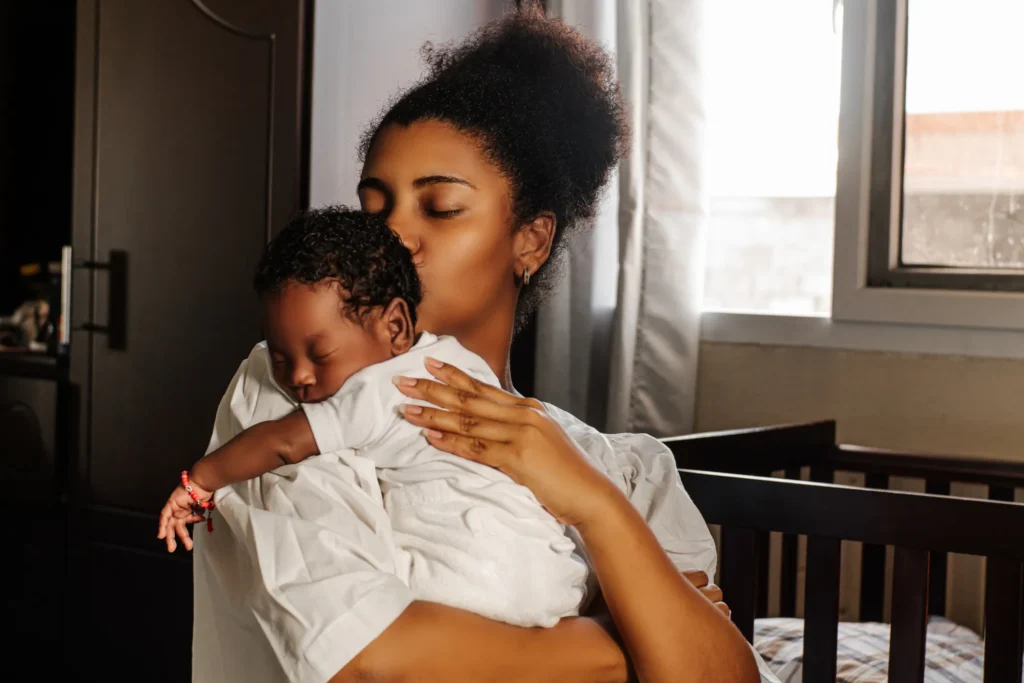Photo Credit: Getty/Djavan Rodriguez
Mica Whitfield of 9to5 says the Trump administration’s $5,000 “baby bonus” is “an insult to the real financial burden families face.”
By: Mica Whitfield,
If this administration wants to push for a “baby boom,” it must first fix the broken system families are forced to navigate. Because without the care and resources we need — it’s not a boom, it’s a bust.
There were a few years after I gave birth that I couldn’t work full time — not because I didn’t want to, but because with the cost of child care we wouldn’t break even. Like so many other mothers, I weathered the storm. I worked gig jobs and found child care through friends or family, while stretching every dollar.
I re-entered the workforce full-time, determined to do work that matters to women like me. Women who are kept out of the workforce and crushed under the weight of a system that prioritizes billionaires over working families. A system that leaves us women, especially women of color, navigating career paths that are anything but linear, juggling dreams with daycare costs, and who are told to “just figure it out” without any real support.
The Financial Burden Families Face
When I saw that the Trump Administration is proposing a $5,000 “baby bonus” to encourage people to have more children, I was appalled. Not by the idea of helping families — because we do need help, and we need it fast — but by how unserious the solution is. Because let’s be honest: $5,000 doesn’t come close to covering the cost of giving birth, let alone raising a child. It’s an insult to the real financial burden families face.
Childbirth in the U.S costs around $19,000 before insurance. Without insurance, that bill can exceed $30,000, and if there are any complications, it can be even higher. On top of that, infant care in many states costs more than $15,000 a year. That’s daycare, diapers, formula, medical visits, and all the baby gear you suddenly can’t live without.
And the financial strain doesn’t stop there. We see it in lost wages, missed promotions, and the part-time jobs we are often forced to take because the workday doesn’t align with the demands of raising a child.
Meanwhile, the very same administration is actively destroying programs that working families of color survive on, like Medicaid, which funds about 41% of all births in the U.S. and, Head Start, which provides child care and meals to children.
We’re not addressing the real issues that impact maternal and child health.
Pushing this “baby bonus” alongside programs that teach us about our menstrual cycles is entirely backwards. We’re not addressing the real issues that impact maternal and child health. For instance, why are we not teaching about prenatal care or the importance of dental care during pregnancy — something many people don’t think about? Why isn’t there more education around perinatal mood disorders, postpartum depression, or the risks of preeclampsia and gestational diabetes, which are far too common and dangerous?
We need to focus on making pregnancy and parenthood safe and more affordable for everyone. The U.S. has some of the highest maternal mortality rates of any developed country, with Black women’s maternal death rates that are three to four times higher than those of white women. In Georgia, where 9to5 works to fight for working families, the pregnancy-related death rate ranks among the worst in the nation. And these deaths are preventable.
Let’s not forget the failure of our child care system for both parents and providers. Child care is unaffordable, and those who care for our children are underpaid and overworked. Until we tackle these real solutions, any attempt to “boost birth rates” is just harmful neglect and shows no real concern for working families.
The Lasting Changes We Need to Start With
- Paid family leave that allows parents to show up for their families without risking their jobs or paychecks.
- Affordable child care that doesn’t drain family budgets or force parents to choose between work and care.
- Workplace policies that support parents, offering flexible hours and remote work options
- Lowering maternal mortality rate by addressing the disparities that exist for women of color.
- Expanded access to high-quality, affordable health care for everyone who chooses to become pregnant, and so much more.
The real solutions are right in front of us, and we’ve been demanding them for years. All we need is for those in power to listen — to actually hear the voices of the people who are living these struggles every day.





